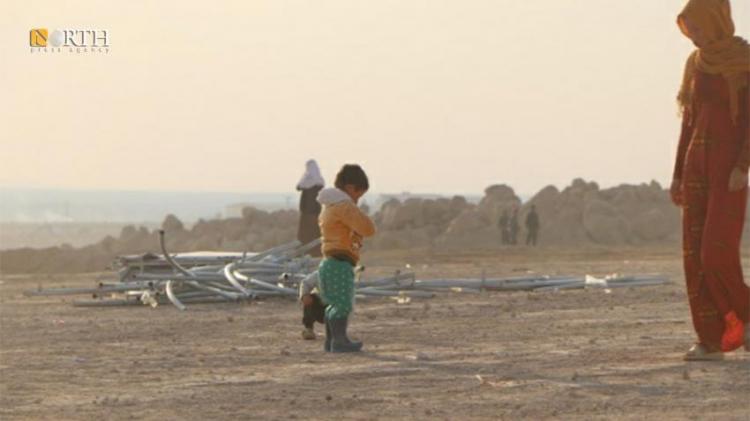UN Security Council keeps Northeastern Syria's in limbo again
After the United Nations Security Council agreed on the entry of humanitarian aid into Syria through one crossing, United Nations aid agencies said that the decision will lead to loss of life and affect millions of Syrian civilians.
Aid cannot reach entire war-torn areas from one crossing point; insisting on only one crossing point is unfair and it doesn't meet the needs of all people.
The UN Security Council's de-authorization of Yarubiyeh crossing for cross-border supply due to the threat of a veto of the entire resolution by Russia has also affected supplies. Yarubiyeh was primarily used by the World Health Organization (WHO) to provide supplies to northeast Syria.
Northeast Syria which has an estimated population of 3 million, led by the Kurdish Authorities so-called Autonomous Administration, which are believed to be under threat of starvation and suffering by this decision.
“With this decision, we are literally left alone to deal with an unfolding catastrophe,” said Luqman Ehmi, spokesman for the Kurdish-led Autonomous Administration in North and East Syria.
This will affect hundreds of thousands of people from different communities living there, in addition to the displaced distributed in about 11 camps in northeastern Syria, of whom the aid will not cover, such as Hol, Nawroz, Washokani, Twahina, Mahoudliy, Abu Khashab and Roj camps.
UN director at Human Rights Watch, Louis Charbono, has said civilians are in difficult situations in Kurdish areas of Syria.

Camps in northeastern Syria (circulated)
– Twahina camp number of individuals: 1,491
– Manbij East Old camp number of individuals: 2,435
– Manbij East New camp number of individuals: 2,833
– Mahmoudliy camp number of individuals: 6,122
– Areesheh camp number of individuals: 8,585
– Hol camp number of individuals: 69,015
– Abu Khashab camp number of individuals: 5,466
Immense obstacles in global pandemic
"Blocking access to food, healthcare supplies, vaccines, ventilators and respirators is unacceptable anytime but in the year of COVID-19, it is even more reprehensible," said International Rescue Committee IRC president David Miliband in a statement.
Local authorities and humanitarian groups in Northeast Syria say they faced immense obstacles in putting a COVID-19 preparedness plan in place. They were unable to bring additional supplies into the region because the border with the Kurdistan Region of Iraq was closed.
The pandemic could potentially get far worse if all nations do not adhere to basic healthcare precautions, the WHO has warned.
In northeastern areas, there was a lack of coronavirus testing kits, while the WHO sent test kits to Syria’s Idlib province, which is under the control of Turkey and its opposition groups such as Hayat Tahrir al-Sham (HTS). The WHO also delivered 1,200 testing kits to Syrian Government areas.
Moreover, the only remaining lifelineefor crossing is Bab Hawa, under the control of Turkish forces and its affiliated armed opposition group HTS.
Idlib-based media activist Hassan Ali told North Press that HTS took a percentage of every aid truck entering Idlib.
"HTS imposed fees on organizations, took part of Syrians' relief aid and monopolized it, which negatively affected the displaced, especially the camp residents," he added.
With the recent resolution, council will give terrorist groups a chance to make use of this aid and arm other groups in order to fight and re-fuel conflicts in Syria, which may worsen Syrians' suffering and foil efforts to end the crisis in Syria.

A photo shows border crossings under HTS control (circulated)

HTS members in military training ( circulated)
Extra burdens
The Syrian Democratic Forces (SDF) in conjunction with Global Coalition have fought ISIS since 2014. They protected Europe from the Islamic State’s nightmare.
During the operations to clear ISIS remnants from northeast Syria, SDF sacrcificed thousands of martyrs from all communities, leaving many families without breadwinners.
Now they are operating more than 24 detention centers throughout northeastern Syria holding about 10,000 ISIS fighters, of among which are about 2,000 foreigners whose countries have refused to repatriate them, including about 800 Europeans.
These detainees also need necessities of life. If every ISIS member eats a one dollar meal, in this case 10,000 dollars would be needed per day.
In a wave of sanctions, Turkey's violations, siege and one crossing border only left for aid, Kurdish authorities' burdens in northeastern Syria will increase, and they will struggle to keep three million people safe.
When the United Nations Security Council first allowed the operation of cross-border assistance to Syria in 2014, it also included access from Jordan and Iraq. The question now is, why did the authorized countries in the council accept the aid entry only from the Turkish-held border crossing, leaving millions of Syrians in limbo?

Suffering of displaced in Northeastern Syria's camps
Reporting by Roha Muhammad

